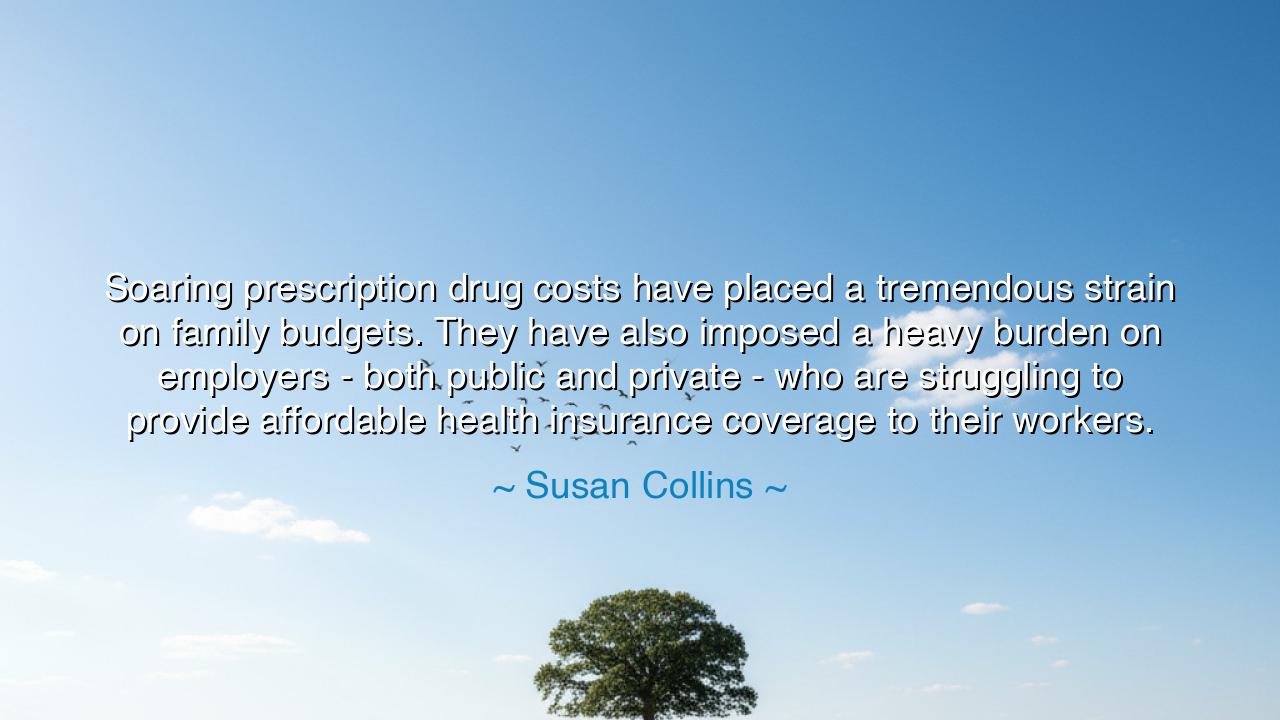
Soaring prescription drug costs have placed a tremendous strain
Soaring prescription drug costs have placed a tremendous strain on family budgets. They have also imposed a heavy burden on employers - both public and private - who are struggling to provide affordable health insurance coverage to their workers.






“Soaring prescription drug costs have placed a tremendous strain on family budgets. They have also imposed a heavy burden on employers — both public and private — who are struggling to provide affordable health insurance coverage to their workers.” These words of Susan Collins, a senator known for her moderation and compassion, echo like a lament across the vast landscape of modern civilization. They speak not only of economics, but of justice, of care, and of the sacred bond between a society and its people. For in these few lines, Collins reveals a truth as old as time: that when the price of healing becomes a weight too great for the common man to bear, the soul of the nation itself begins to weaken.
In the ancient world, health was seen not as a commodity, but as a divine trust. The physician was guided by honor, not by profit. Hippocrates, the father of medicine, swore to serve the sick without greed or selfishness. The temple of Asclepius in Greece was open to all, rich and poor alike, for the ancients understood that to heal one life was to heal the whole community. Yet in our age, the medicines that once symbolized mercy have become chains of debt and despair. Collins, in her wisdom, does not speak in anger but in sorrow, for she knows that a society that prices relief beyond reach risks losing both its compassion and its conscience.
Her words also shine a light upon the burden of the working class, who toil to build and sustain the wealth of the nation, yet find themselves crushed beneath the cost of their own survival. The family that must choose between medicine and food is not free; the employer who must choose between caring for his workers and keeping his business alive is not at peace. Here, Collins reminds us of a forgotten truth — that health is the foundation of all prosperity. When illness spreads unchecked because medicine is unaffordable, when workers fall into ruin because healing is reserved for the wealthy, the strength of the nation withers from within.
Consider the story of President Franklin D. Roosevelt, who, though paralyzed by polio, became a pillar of endurance for his people. In his time, America faced not only the Great Depression but the rising challenge of securing care for its citizens. Roosevelt’s New Deal sought to restore dignity and hope, not by giving alms, but by building systems that strengthened the public good. Yet even in his era, the vision of universal and affordable health care was but a distant dream. It would take decades, and the courage of many, to even begin to approach that vision — and still, as Collins warns, it remains incomplete.
In her statement, Collins also speaks to the employers, the stewards of livelihood. Once, the ancient guilds and tribes understood the sacred duty of mutual care: that the craftsman must look after his apprentice, the farmer after his field hand, the ruler after his people. But in the modern age, as costs soar and compassion falters, even the most honorable employers find their resources drained by the rising tide of expense. They, too, suffer — not only in wealth, but in spirit — as they must choose between cutting benefits or closing doors. Thus, the burden of soaring drug costs becomes a shared suffering that erodes trust and divides the common good.
It is easy, in the face of such vast challenges, to yield to cynicism — to believe that greed is inevitable, that medicine must always come with a price. But Collins’ words call us instead to collective courage, to remember that policies are not abstractions, but the living choices that shape our neighbors’ lives. She urges us to see health care not as an expense, but as an investment in humanity. When a family can afford to heal, they can work, dream, and build. When a worker can access medicine without fear of debt, the employer gains strength, and the whole nation flourishes.
Therefore, O children of tomorrow, take this lesson to heart: a civilization’s greatness is measured not by its wealth, but by the mercy it extends to the weak. The cost of healing must never exceed the value of a human life. Let those who govern seek balance between innovation and compassion. Let citizens demand transparency and fairness from those who profit from medicine. And let every heart remember that to make healing accessible is not merely an act of policy — it is an act of love.
For when the day comes that no mother fears the price of her child’s medicine, when no worker must choose between his health and his home, then — and only then — shall we say that we have become not merely a prosperous people, but a wise and compassionate nation, worthy of the name of humankind.






AAdministratorAdministrator
Welcome, honored guests. Please leave a comment, we will respond soon